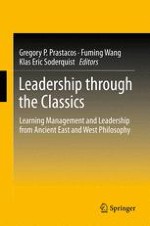2012 | OriginalPaper | Buchkapitel
25. Integrating Oriental Wisdom in MBA Education: The Case of Confucianism
verfasst von : Sompop Manarungsan, Zhimin Tang
Erschienen in: Leadership through the Classics
Verlag: Springer Berlin Heidelberg
Aktivieren Sie unsere intelligente Suche, um passende Fachinhalte oder Patente zu finden.
Wählen Sie Textabschnitte aus um mit Künstlicher Intelligenz passenden Patente zu finden. powered by
Markieren Sie Textabschnitte, um KI-gestützt weitere passende Inhalte zu finden. powered by
